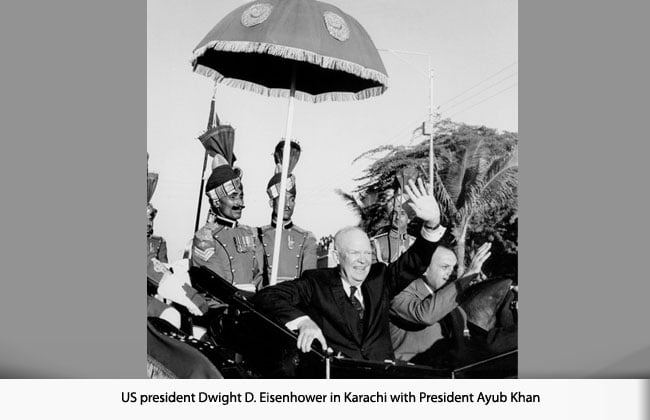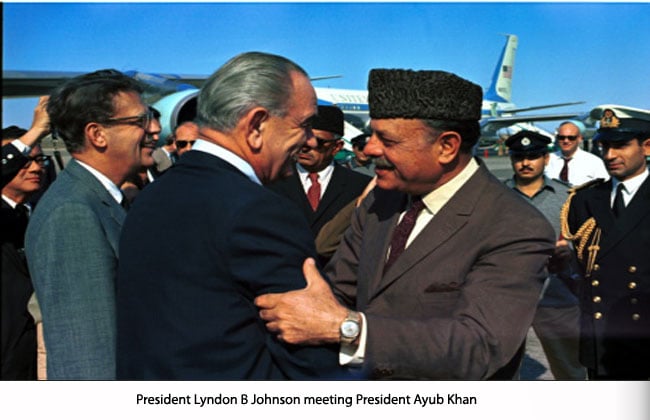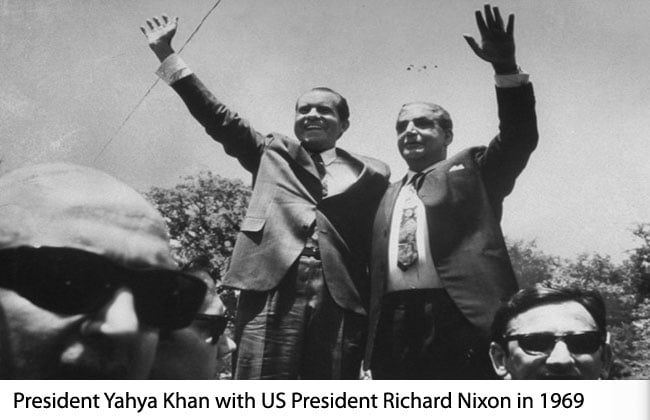Trump, if visits, to be the first for democratic Pakistan
ISLAMABAD: If US president-elect Donald Trump fulfils the promise of visiting Pakistan he made during a telephonic conversation with Prime Minister Nawaz Sharif on Wednesday, it will be first ever visit of a US president to Pakistan in its 70-year history during the tenure of a democratic government.
The United States always remained more comfortable with the military dictators in Pakistan and all the five US presidents, who visited Pakistan, came here during the regimes of Ayub, Yahya, Zia and Musharraf.
Washington always remained happy with military dictators in Karachi or Islamabad and preferred settling issues with them over and above any role of civilians.
According to experts on US-Pak relations, Americans trusted military rulers throughout our history because they always gave excellent results and obeyed most of the orders. Breaking of the country in 1971 (military rule started in 1958 only came to an end when Pakistan divided), almost complete deterioration of Pakistani society and its social ranks from 1977 to 1988 and collapse of Pakistan’s economy 1999 to 2007 – everything happened during military regimes but the US working relationship with administrations led by dictators in Pakistan was always great.
Trump has promised to change America and if as a consequence of his policies of change he also changes Uncle Sam policy towards Pakistan, it will certainly help the country overcome many of its basic problems.
US President Dwight D Eisenhower visited Karachi from Dec 7–9, 1959 during the regime of the first army dictator. Pakistan came into being in 1947 and 1950s is considered a period when Pakistan was progressing though it started its journey from rags. No US president visited Pakistan until army came into power in Oct 1958.
 US President Lyndon B Johnson visited Karachi on Dec 23, 1967 and met Ayub. US President Richard Nixon visited Pakistan from August 1–2, 1969. It was a state visit and Nixon met the second military dictator of Pakistan.
US President Lyndon B Johnson visited Karachi on Dec 23, 1967 and met Ayub. US President Richard Nixon visited Pakistan from August 1–2, 1969. It was a state visit and Nixon met the second military dictator of Pakistan.

 Nixon and second military dictator Gen Yahya Khan remained in touch subsequently. The News has reported few days back a recent interview of former US secretary of state Henry Kissinger to US magazine ‘The Atlantic’, according to which Yahya had assured Nixon in Nov 1971, many days before the start of India-Pakistan war in East Pakistan (now Bangladesh), that Islamabad will grant independence to East Pakistanis soon. This shows state of affairs during the rules of military dictators.
Nixon and second military dictator Gen Yahya Khan remained in touch subsequently. The News has reported few days back a recent interview of former US secretary of state Henry Kissinger to US magazine ‘The Atlantic’, according to which Yahya had assured Nixon in Nov 1971, many days before the start of India-Pakistan war in East Pakistan (now Bangladesh), that Islamabad will grant independence to East Pakistanis soon. This shows state of affairs during the rules of military dictators.
US President Bill Clinton visited Pakistan on March 25, 2000 and met the fourth military dictator. Clinton was also made to address the people of Pakistan through radio. It is important to mention that Pakistan remained under democratic regimes from 1988 to 1999 but no US president visited Pakistan. Clinton who became US President in 1992 visited Pakistan only in 2000 simply few weeks after military takeover as if he was only waiting for this moment. This visit of Clinton however was for few hours.
 US President George W Bush, who visited Pakistan from March 3–4, 2006, was given a red-carpet welcome by Pakistan’s fourth military dictator.
US President George W Bush, who visited Pakistan from March 3–4, 2006, was given a red-carpet welcome by Pakistan’s fourth military dictator.
 According to Prime Minister’s Office, Nawaz called Trump and facilitated him on his electoral victory. “I am looking forward to see you soon,” a PM Office release quoted Trump as saying.
According to Prime Minister’s Office, Nawaz called Trump and facilitated him on his electoral victory. “I am looking forward to see you soon,” a PM Office release quoted Trump as saying.
The release adds, “On being invited to visit Pakistan by the Prime Minister Mr Trump said that he would love to come to a fantastic country, fantastic place of fantastic people.” Keeping aside breaking of Pakistan as a consequence of 12 years long military rule and destruction of Pakistan’s society during Zia regime from 1977 to 1988, the eight-year long rule Musharraf, who was consider very close to Washington, virtually destroyed Pakistan as a nation state and also the country’s economy.
Pakistanis are still paying the price. Energy in the form of electricity and gas is backbone of industry in any country in the present world. Pakistan was facing more than 12 hours loadshedding the day Musharraf quit power. No major power generation project was completed and there had been complete lack of futuristic vision, approach or planning on this count.
The only thing Musharraf had done for power generation was the repeated marketing of irrational and ridiculous planning and its repeated mention in stories and write-ups of some journalists. Pakistan’s gas reserves were depleting and industry could face a natural death as a consequence but the military ruler, intoxicated with power and claiming to be the wisest person, failed to even foresee the disastrous situation approaching towards Pakistan.
Now even if the country starts getting gas through LNG and even its all needs are met and the government overcomes loadshedding, Pakistan and Pakistanis will continue to pay the price for lack of futuristic approach and ill planning during the fourth military for many decades to come. The promise made by Trump with Nawaz has come as a pleasant surprise for Pakistanis but only time will prove whether the US president-elect fulfils his promise.
-
 Hailee Steinfeld Reveals Her Plans To Return To Music
Hailee Steinfeld Reveals Her Plans To Return To Music -
 Elon Musk Unveils SpaceX Plan For Civilian Moon, Mars Trips
Elon Musk Unveils SpaceX Plan For Civilian Moon, Mars Trips -
 MTG Commander Banned Update: Wizards Frees Infamous Instant-win Card
MTG Commander Banned Update: Wizards Frees Infamous Instant-win Card -
 Royal Family Braces For ‘final Blow’ As Andrew Scandal Deepens
Royal Family Braces For ‘final Blow’ As Andrew Scandal Deepens -
 Snow Forecast Warns Of Reduced Visibility And Travel Risks In Ontario
Snow Forecast Warns Of Reduced Visibility And Travel Risks In Ontario -
 Margot Robbie Reveals 'worst' Gift She Received From Co-star
Margot Robbie Reveals 'worst' Gift She Received From Co-star -
 Casey Wasserman Says He ‘deeply Regrets’ Ghislaine Maxwell Emails After DOJ File Release
Casey Wasserman Says He ‘deeply Regrets’ Ghislaine Maxwell Emails After DOJ File Release -
 Discord Face Scan Age Verification Rules Explained As Platform Tightens Access
Discord Face Scan Age Verification Rules Explained As Platform Tightens Access -
 Cavaliers Vs Nuggets Showdown Heats Up After Blockbuster Trade
Cavaliers Vs Nuggets Showdown Heats Up After Blockbuster Trade -
 Where Kelsea Ballerini, Chase Stokes Stand After Second Breakup
Where Kelsea Ballerini, Chase Stokes Stand After Second Breakup -
 'Disgraced' Andrew Hit With Reality Of Life Beyond Royal Bubble
'Disgraced' Andrew Hit With Reality Of Life Beyond Royal Bubble -
 Thunder Vs Lakers: LeBron James Playing As Lakers Miss Luka Dončić
Thunder Vs Lakers: LeBron James Playing As Lakers Miss Luka Dončić -
 Pistons Vs Hornets Recap: Brawl Erupts With 4 Players Getting Tossed Before Detroit Victory
Pistons Vs Hornets Recap: Brawl Erupts With 4 Players Getting Tossed Before Detroit Victory -
 Gordie Howe Bridge Faces Uncertainty After Trump Warning To Canada
Gordie Howe Bridge Faces Uncertainty After Trump Warning To Canada -
 Air Canada’s Flights To Cuba Halted As Aviation Fuel Crisis Worsens
Air Canada’s Flights To Cuba Halted As Aviation Fuel Crisis Worsens -
 Marc Anthony Weighs In On Beckham Family Rift
Marc Anthony Weighs In On Beckham Family Rift



